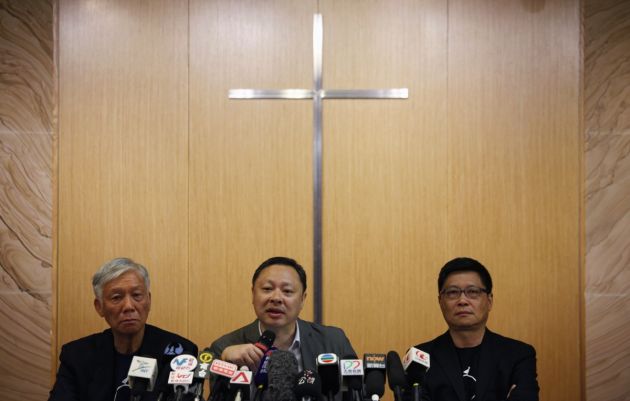Cardinal Zen doubts Hong Kong cry for full democracy will be heeded

Hong Kong Roman Catholic leader Cardinal Joseph Zen says turnout by nearly 800,000 people in an unofficial referendum to pursue democratic freedom shows people in the territory want genuine democracy, but he doubts the authorities will heed the call.
Cardinal Joseph Zen, who supported the referendum Sunday, said the 780,000 who voted showed people want democracy in Hong Kong, "but the government may not accept any of the three proposals in the end or may just back off a bit," he said.
Zen led 200 supporters on a seven-day march around Hong Kong earlier in June to promote the referendum, the Catholic new agency ucanews.com reported.
More than 500 protesters at a Hong Kong sit-in were arrested after police broke ta pro-democracy rally on Wednesday which organisers said drew a turnout of more than half a million people, Al Jazeera news reported.
The unofficial 10-day poll which ended on June 30 was organized by protest group Occupy Central in response to a policy paper from Beijing stating that there could be no full democracy in Hong Kong.
The Chinese government paper affirmed that there will be direct elections in 2017 but that all the candidates would be selected by a "nominating committee" whose members would still be chosen by Beijing.
During the poll, the voters were asked to choose which of three proposals -- options allow citizens to directly nominate candidates - are to be presented to the Beijing government.
The popular vote revealed that candidates should be nominated by 35,000 registered voters, or by any political party which has at least 5 percent of the vote in the last election for Hong Kong's legislative committee. The proposal also promotes the nominating committee to name candidates.
Presently, the Chief Executive is "elected" by a 1,200-person Election Committee. The Election Committee is directly or indirectly chosen by the Chinese Communist authorities in Beijing and their local representatives.
"The people want to make their voices heard." Chen Jianmin, sociology professor at the University of Hong Kong and one of the founders of Occupy Central, said after the successful turnout of the referendum.
But not everyone is happy. Pro-Beijing groups marched through the Causeway Bay district urging people not to vote. Important people in the Communist regime are also aggravated about the referendum.
The Global Times, a China' State-run newspaper warned, "The oppositions in Hong Kong should understand and accept that Hong Kong is not an independent country. They should not think that they have the ability to turn Hong Kong into Ukraine or Thailand."
China agreed to govern Hong Kong under the "one country, two systems" policy when Britain ceded its control of the colony in 1997. Under the policy Hong Kong would enjoy "a high degree of autonomy, except in foreign and defense affairs" for 50 years.
